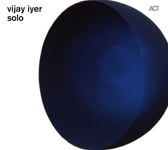|
|
 |
Dusted Reviews
Artist: Vijay Iyer Album: Solo Label: ACT Music Review date: Sep. 21, 2010 |

|
|
|
 |
After more than a dozen albums as headman or co-leader since 1995, Vijay Iyer has finally released a solo album. In many ways, Solo follows a clear lineage through the more intimate and lyrical sounds that Iyer has been cultivating during the past few years. And yet, there is a drastic shift in mood and focus. The title of one of his centerpiece compositions may hint at this: “Autoscopy” refers to the out-of-body feeling that Iyer claims to experience when he plays music. “You observe your actions from outside of (usually above) your body,” he writes. As an album, Solo is so intensely introspective, it becomes less about the subjective self and more about a simultaneous inside and outside view of Iyer as a musical vessel.
A sense of reverence that borders on the spiritual resonates throughout the album, not only through Iyer’s selection of pieces by musicians he admires, but also through the way he makes those musicians come to life through his own performances.
Jazz standards and other covers take up more than half of the album. In the two Duke Ellington pieces, Iyer demonstrates skill by remaining lovingly faithful to Ellington’s rich, orchestral piano sound. In other cases, Iyer playfully mixes and matches using his toolbox of influences. “Epistrophy” sounds as if Steve Reich took a line from Thelonious Monk, applied his additive compositional methods to it, and asked Cecil Taylor to play it. On the following track, “Darn that Dream,” the romantic and sensuous Tin Pan Alley cocktail piece slips into the curious world of Monk interpreted through Sun Ra. In “Human Nature,” Iyer turns a Michael Jackson hit into a rhythmically shifted jazz ballad of the 21st century without the slightest sense of irony, staying true to the beauty of the original.
The four middle tracks are a set of original compositions that unveil how various influences percolated within Iyer as a musician (count among them Monk, Ellington, Taylor, Reich, Andrew Hill, Muhal Richard Abrams, as well as a nod to Indian classical music). With Iyer at his most exposed and vulnerable, those influences shine through. The meditative “Prelude” leads to an inner struggle that suddenly lifts to the lucid experience of “Autoscopy.” “Patterns” then builds on a raga-like melody with mathematical precision as a joyful expression of intelligent and elegant improvisation. The set ends with a return inward, to the stillness of “Desiring.”
To make so many overt references to his musical heroes while never losing sight of himself speaks to Iyer’s own command. His improvisations have such clarity and vision, and it’s rare that he stretches things any longer than necessary. Present throughout his performances are smart (but never smug) developments of melodic motives, solid rhythmic precision and flexibility demonstrated through his love of polyrhythmic play. The distinct way in which he articulates shades of dynamic chiaroscuro are unmistakably his own.
By Miki Kaneda
|







